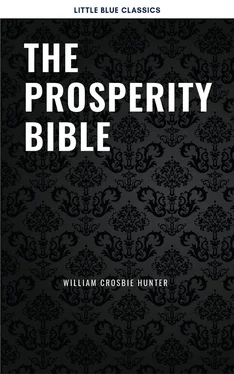So a man who advertises at all must keep it up until the public know who and what he is, and what his business is, or else the money invested in advertising is lost.
Some men have a peculiar genius for writing a striking advertisement, one that will arrest the attention of the reader at first sight. This fact, of course, gives the advertiser a great advantage. Sometimes a man makes himself popular by an unique sign or a curious display in his window. Recently I observed a swing sign extending over the sidewalk in front of a store, on which was the inscription in plain letters,
"DON'T READ THE OTHER SIDE."
Of course I did, and so did everybody else, and I learned that the man had made an independence by first attracting the public to his business in that way and then using his customers well afterwards.
Genin, the hatter, bought the first Jenny Lind ticket at auction for two hundred and twenty-five dollars, because he knew it would be a good advertisement for him. "Who is the bidder?" said the auctioneer, as he knocked down that ticket at Castle Garden. "Genin, the hatter," was the response. Here were thousands of people from the Fifth avenue, and from distant cities in the highest stations in life. "Who is `Genin,' the hatter?" they exclaimed. They had never heard of him before. The next morning the newspapers and telegraph had circulated the facts from Maine to Texas, and from five to ten millions of people had read that the tickets sold at auction for Jenny Lind's first concert amounted to about twenty thousand dollars, and that a single ticket was sold at two hundred and twenty-five dollars, to "Genin, the hatter." Men throughout the country involuntarily took off their hats to see if they had a "Genin" hat on their heads. At a town in Iowa it was found that in the crowd around the post office, there was one man who had a "Genin" hat, and he showed it in triumph, although it was worn out and not worth two cents. "Why," one man exclaimed, "you have a real `Genin' hat; what a lucky fellow you are." Another man said, "Hang on to that hat, it will be a valuable heir-loom in your family." Still another man in the crowd who seemed to envy the possessor of this good fortune, said, "Come, give us all a chance; put it up at auction!" He did so, and it was sold as a keepsake for nine dollars and fifty cents! What was the consequence to Mr. Genin? He sold ten thousand extra hats per annum, the first six years. Nine-tenths of the purchasers bought of him, probably, out of curiosity, and many of them, finding that he gave them an equivalent for their money, became his regular customers. This novel advertisement first struck their attention, and then, as he made a good article, they came again.
Now I don't say that everybody should advertise as Mr. Genin did. But I say if a man has got goods for sale, and he don't advertise them in some way, the chances are that some day the sheriff will do it for him. Nor do I say that everybody must advertise in a newspaper, or indeed use "printers' ink" at all. On the contrary, although that article is indispensable in the majority of cases, yet doctors and clergymen, and sometimes lawyers and some others, can more effectually reach the public in some other manner. But it is obvious, they must be known in some way, else how could they be supported?
17
BE POLITE AND KIND TO YOUR CUSTOMERS
Politeness and civility are the best capital ever invested in business. Large stores, gilt signs, flaming advertisements, will all prove unavailing if you or your employees treat your patrons abruptly. The truth is, the more kind and liberal a man is, the more generous will be the patronage bestowed upon him. "Like begets like." The man who gives the greatest amount of goods of a corresponding quality for the least sum (still reserving for himself a profit) will generally succeed best in the long run. This brings us to the golden rule, "As ye would that men should do to you, do ye also to them," and they will do better by you than if you always treated them as if you wanted to get the most you could out of them for the least return. Men who drive sharp bargains with their customers, acting as if they never expected to see them again, will not be mistaken. They will never see them again as customers. People don't like to pay and get kicked also.
One of the ushers in my Museum once told me he intended to whip a man who was in the lecture-room as soon as he came out.
"What for?" I inquired.
"Because he said I was no gentleman," replied the usher.
"Never mind," I replied, "he pays for that, and you will not convince him you are a gentleman by whipping him. I cannot afford to lose a customer. If you whip him, he will never visit the Museum again, and he will induce friends to go with him to other places of amusement instead of this, and thus you see, I should be a serious loser."
"But he insulted me," muttered the usher.
"Exactly," I replied, "and if he owned the Museum, and you had paid him for the privilege of visiting it, and he had then insulted you, there might be some reason in your resenting it, but in this instance he is the man who pays, while we receive, and you must, therefore, put up with his bad manners."
My usher laughingly remarked, that this was undoubtedly the true policy, but he added that he should not object to an increase of salary if he was expected to be abused in order to promote my interest.
Of course men should be charitable, because it is a duty and a pleasure. But even as a matter of policy, if you possess no higher incentive, you will find that the liberal man will command patronage, while the sordid, uncharitable miser will be avoided.
Solomon says: "There is that scattereth and yet increaseth; and there is that withholdeth more than meet, but it tendeth to poverty." Of course the only true charity is that which is from the heart.
The best kind of charity is to help those who are willing to help themselves. Promiscuous almsgiving, without inquiring into the worthiness of the applicant, is bad in every sense. But to search out and quietly assist those who are struggling for themselves, is the kind that "scattereth and yet increaseth." But don't fall into the idea that some persons practice, of giving a prayer instead of a potato, and a benediction instead of bread, to the hungry. It is easier to make Christians with full stomachs than empty.
Some men have a foolish habit of telling their business secrets. If they make money they like to tell their neighbors how it was done. Nothing is gained by this, and ofttimes much is lost. Say nothing about your profits, your hopes, your expectations, your intentions. And this should apply to letters as well as to conversation. Goethe makes Mephistophiles say: "Never write a letter nor destroy one." Business men must write letters, but they should be careful what they put in them. If you are losing money, be specially cautious and not tell of it, or you will lose your reputation.
20
PRESERVE YOUR INTEGRITY
It is more precious than diamonds or rubies. The old miser said to his sons: "Get money; get it honestly, if you can, but get money." This advice was not only atrociously wicked, but it was the very essence of stupidity. It was as much as to say, "if you find it difficult to obtain money honestly, you can easily get it dishonestly. Get it in that way." Poor fool! Not to know that the most difficult thing in life is to make money dishonestly! not to know that our prisons are full of men who attempted to follow this advice; not to understand that no man can be dishonest, without soon being found out, and that when his lack of principle is discovered, nearly every avenue to success is closed against him forever. The public very properly shun all whose integrity is doubted. No matter how polite and pleasant and accommodating a man may be, none of us dare to deal with him if we suspect "false weights and measures." Strict honesty, not only lies at the foundation of all success in life (financially), but in every other respect. Uncompromising integrity of character is invaluable. It secures to its possessor a peace and joy which cannot be attained without it—which no amount of money, or houses and lands can purchase. A man who is known to be strictly honest, may be ever so poor, but he has the purses of all the community at his disposal—for all know that if he promises to return what he borrows, he will never disappoint them. As a mere matter of selfishness, therefore, if a man had no higher motive for being honest, all will find that the maxim of Dr. Franklin can never fail to be true, that "honesty is the best policy."
Читать дальше












